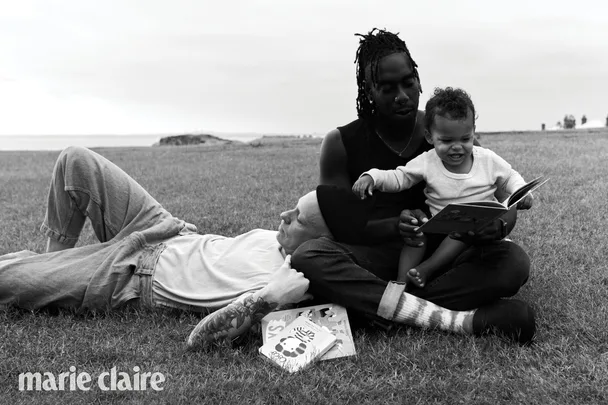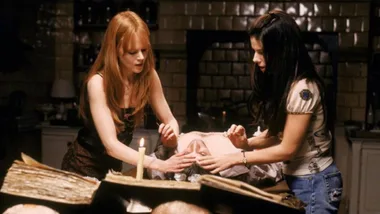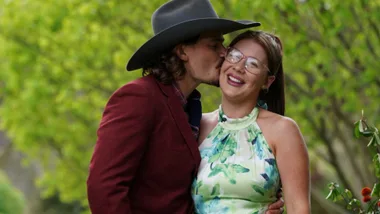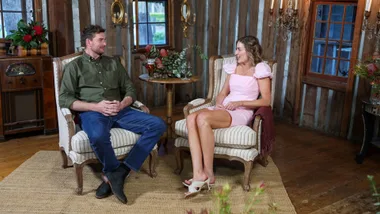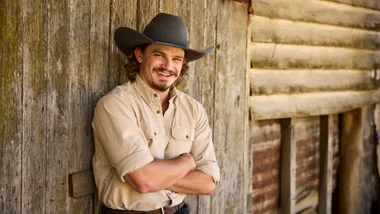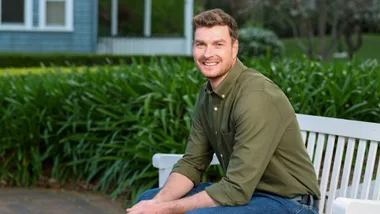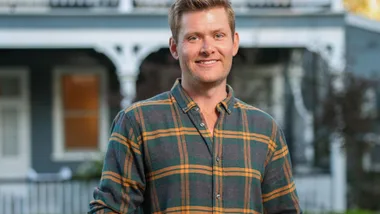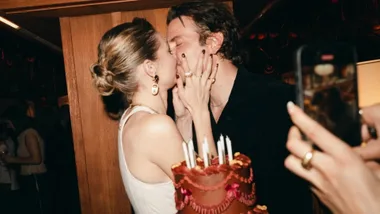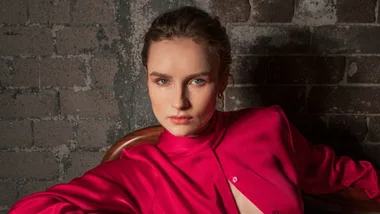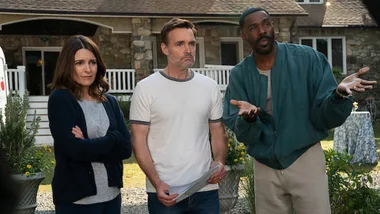A Hole cover band was playing the first time Kelly (left) told Spencer they loved him. The couple had only known each other a few days – a Melbourne resident at the time, Spencer was visiting San Francisco for the Pride Festival and the pair didn’t expect the romance to extend past the holiday. But it just felt right. “I remember thinking, Well, it’s OK to immerse yourself in this for right now; whatever happens next, happens next,” says Kelly.
Nearly 10 years, a few stints of forced long-distance, a wedding, and one (exceptionally adorable) baby named Alexis later, the duo are just as in love. They credit couples therapy and an enduring commitment to each other for keeping their relationship strong beyond its whirlwind beginning. “Our story hasn’t always been perfect. We really work for our relationship,” explains Kelly. “Being queer, sometimes things like marriage or having kids feels really heteronormative and you’re like, ‘Oh, that’s just not my vibe. I realised that you can do all those things and still be quite radical.”
When they welcomed their son 18 months ago, their concept of love was again transformed. “I’m in awe of watching my partner with our child, watching my family, and our friends,” says Spencer. “It’s so beautiful. Once you have a child, in our experience, love just expands to these whole new realms.”
Here, the couple share how the fell, and stay, in love.
marie claire: How did you first meet?
Spencer: It was 2011, we met in a bar in San Francisco called SF Underground. I was visiting San Francisco with some friends for Pride. I walked in and Kelly was standing at the bar, I’d seen them on the internet before because they were connected with some friends. I thought, ‘there’s nothing to lose’, so I offered to buy them a drink, they said yes and then, when I got the drink, I took it over to them but they were talking to someone else. I guess I was a little shy and wanted to give them space so I gave them the drink and walked away. They had the drink and then they left. It wasn’t until days went on that I kept running into them around the streets. We ran into each other on our way to this beautiful theatre in the neighbourhood, The Castro, where we were both going to see Paris Is Burning. We just started chatting and eventually I asked a friend for their number and on the final day of Pride, we finally connected and that was it. We spent the rest of my trip together in San Francisco. Afterwards, I flew home and three months later they followed me back to Melbourne.
mc: Wow. So, let’s go back a bit. Something I’m always interested to hear from people is: at what point – or was there a point – where you looked at Kelly and thought, ‘I love this person’?
Spence: Well, no, actually, five days into my trip, we went camping with some friends. Kelly had never been camping, so showed up in some fashion sandals and I was like, ‘oh, shit’.
Kelly: They were a pair of leather sandals that I thought were so cute and chic, and then there were bindis.
Spence: Someone had to lend them some socks so they didn’t get torn up feet. That night, we were sitting around the fire and there was a Hole cover band playing and Kelly told me that they loved me. I was like, “Whoa, this is intense.” It was one of those things where they said it, and it was such a whirlwind time. We were in this really romantic city and everything was falling into place. We had no real responsibilities, it was just very magical. I guess when you say something like that in that moment, it feels normal.
Kelly: He was in San Francisco on a holiday, so it always felt like, “Oh, there’s an expiration date on this.” I just remember thinking to myself, “Well, it’s okay to submerge yourself in this for right now, and then whatever happens next, happens next.
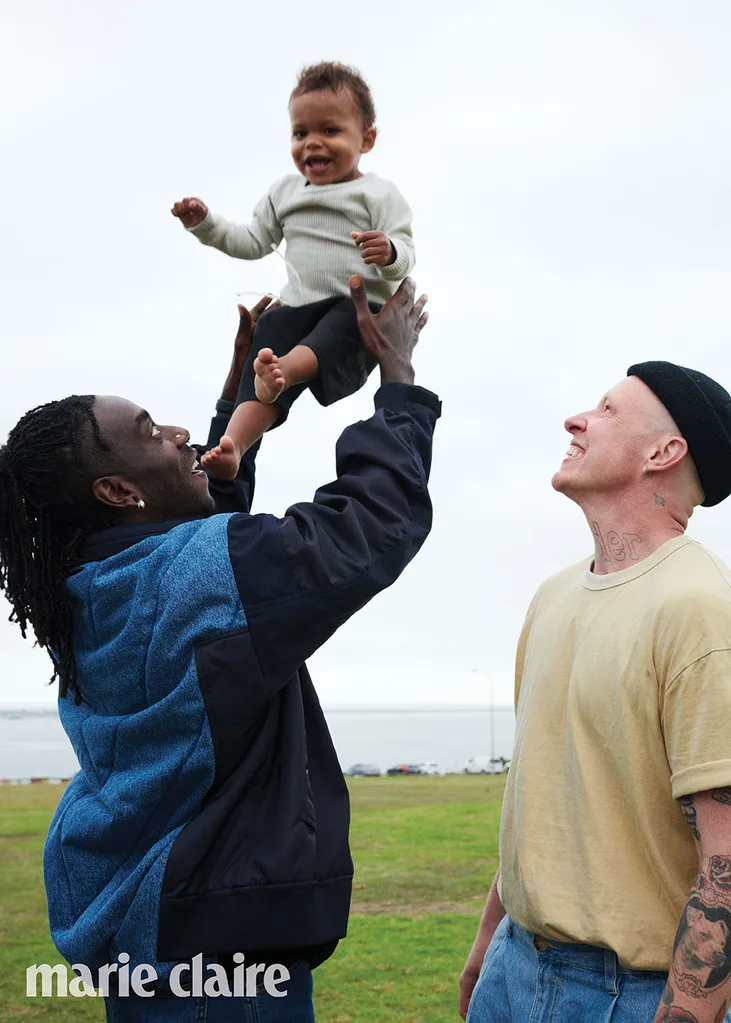
mc: And so what changed? Because you (Spence) left.
Spence: I remember Kelly drove me to the airport and I got on the plane, and we talked about it like, “Well, maybe I’ll come back for Pride again”. Really casual conversations. But then when I landed in Melbourne, we stayed in touch on WhatsApp, and it was just like we didn’t put the fire out, it just kept simmering-
Kelly: Smoldering.
Spence: Smoldering. It wasn’t long after that that there was talk of like, “Well, maybe I’ll come out there”. And then it just ran from there.
mc: When you (Kelly) came out to Australia, did you come with the intent of moving?
Kelly: No, I was in grad school and I took a three month sabbatical. Three months passed really quick, and then I decided to take three more months. Then six months is the longest you could stay on a tourist visa, so at the end of the six months we were like, “Oh, what do we do next?” All right, if we’re going to be together, then we have logistical things to figure out. Like visas, how do we get visas for me to stay? We were visiting Sydney for Mardi Gras and we were hanging out with a friend who’s a lawyer, and she was like, “Why don’t you guys just get married? You love each other and you’ll probably get married one day. Why don’t you just get married now?” And then we were just like, “Yeah, I guess that’s an option.”
Spence: People often say you should get married, especially around visa stuff, like it’s the go-to and it’s interesting because it’s actually not that easy to get. It’s not like you get married and then get a visa, that’s not how it works. I don’t think we really knew what everything meant, what it would mean in the future to get a visa, but we were like, “Fuck it, let’s just get married. It can’t hurt.”
Kelly: But also in Australia, you can’t just have a shotgun marriage. You can’t be like, “Oh, I’m going to get married,” and you go to the courthouse and you get married that day. You have to put in an intent to be married, and that’s 30 days. So we put that in and then had 30 days to be like, “Oh, are we really going to do this?”
Spence: We got married, and then Kelly literally left the country two days later. And we were apart for three months again, and then I came to San Francisco. I had planned to be there for a few months, and then during that time Kelly got offered a job they really wanted to take. So we decided to try to get visas, I ended up getting a green card and we stayed.
Kelly: That’s the short end of it.
Spence: It’s been a long process.
mc: I was going to say, and long distance. Was it because you started off that way, that you were able to find a rhythm with your relationship that just adapted to long distance?
Kelly: Totally.
Spence: There wasn’t a lot we could do about it. But since then, we’ve been able to weather lots of long distance stints, we’ve spent chunks of three months apart, but it just works. It sounds cliché, but once you build a relationship where you both feel really secure or safe, those things, they seem super easy to navigate.
mc: One of my favourite sayings is: all relationships take work, and sometimes, it won’t matter how much work you put in, it just won’t work.
Kelly: Totally.
Spence: I do think that once you find that person, you start to want to make it work. So you find the person that gives you the drive to make it work, and then if you put in work – which we have put in so much work – then it will. And look, it never ends, to be honest. Kelly and I are big proponents of therapy and couples therapy, and we’ve had a consistent therapist now for, like, five years. She’s in San Francisco, to this day, we still see her.
mc: That’s amazing. What went into that decision?
Kelly: It came to a point where we were reaching our four year mark of being together, and we realised it was the longest either of us had ever been with someone and we were like, “Oh, we don’t know what a long-term relationship looks like beyond this.”
Spence: No, that’s not how it happened. Yes, that was the intent, but remember, we had another friend who got a therapist? And they were like, “You should get one, this is actually really helpful,” Then Kelly was like, “Yeah, we don’t know what it is beyond this, maybe we should.” We interviewed a couple different therapists, because we wanted to find the right one. And we did and I now consider her to be part of our story, because if it wasn’t for her advocacy for our relationship and her support, I don’t know that our relationship would what it is today.
mc: Do you think that there are any particular parts of the relationship that she’s really helped?
Spence: Understanding one another. Because people have patterns or things about them that come from so many places – their upbringing, etc. Therapy has really helped me to understand who Kelly is as a person. Once you do that, you get context to understand different behaviours.
A perfect example is before, whenever something would come up, I would want to talk about it straight away. I would be like, “What’s wrong?” And Kelly would be like, “I don’t want to talk about it right now, I need some time,” and I would push, “No, no, no, but I want to…” And in that situation, no one’s going to win; you both have your own ways of dealing with it and they’re conflicting. Over time, I started to understand that that doesn’t mean that they don’t want to tell me or I’ve done something wrong, it just means ‘chill out’.
Kelly: We just had different communication styles, and we had to learn each other’s. Through therapy it gave us perspective on each other’s communication style, and then allowed us to actually communicate.
mc: Yeah. I mean, it’s meeting someone where they’re at, because that’s the thing, everyone is just a whole universe of a person. That kind of answers another question I have, which is: what do you think it takes to stay in love?
Kelly: You have to put in the work, and that can look lots of different ways; seeing a therapist together, or actively communicating. But it also looks like making sure that you’re always dating. We’ve been together almost 10 years, and we still actively date each other. Sometimes when people are in long-term relationships, they forget to date each other. They get really comfortable and they’re like, “I see you every day.” And I’m like, “Yeah, but do you really see them? You see them maybe in passing, but when was the last time you actually looked at your partner?”
Our story hasn’t always been perfect rainbows and sunshine. We really work for our relationship, but making a commitment is committing to working through the difficult times, too. When things come up for Spence and I, I never think to myself, “Oh, this is it, this is going to be the straw that breaks the camel’s back,” or, “This is going to be the thing that ends us.” I’m always like, “being alive means that things are going to come up and I’ve committed to working through things when they do.”
Spence: Society does a really big disservice around relationships, because movies and the portrayal of love and long-term love seems so fantastical. It never talks about the work it takes, it always just presumes that love stays in this romance, but that’s just not how it is. It’s not reality, because you work a job, you have a kid. You really have to have intention.
mc: Did you always know that you wanted to have kids?
Spence: I did.
Kelly: I did not. It was only after being together for a little bit I was just like, “Oh, if I was going to have kids, it would be with this person.” We always had the dialogue around kids. It was really interesting. Being queer, sometimes things like marriage or having kids feels really heteronormative and you’re just like, “Oh, that’s just not my vibe, that’s just not who I am as a person.” And I realised that you can do all those things and still be quite queer and radical. Marriage for us allowed us to be together, it allowed us to find a way to cross borders, which is pretty subversive.
mc: Totally.
Spence: Yeah, and then having a child as two men was, again, a really radical idea. It’s interesting because we’re a married couple, we have a young baby. We’re actually very conventional if you look at it, but then if you actually look at it, it’s pretty radical: we immigrated to two countries, one during a time where gay marriage was illegal. We got denied by the immigration department in the United States for being two men, but then my birth certificate said ‘F’ on it, so we got in under that. We’ve stepped over all of these hurdles and still been very true to ourselves.
mc: You’re queering the idea of what constitutes ‘conventional’.
Spence: Yeah, the thing is; marriage, in and of itself, all it really does in society, it gives you access to things. It’s just a status that gives you access to stuff, and by being queer or whatever, we don’t allow ourselves to have access to that because a lot of queers don’t believe in marriage. It’s this religious institution, it doesn’t really vibe with who we are, right? But in society, it actually comes with things. So we gain access to this thing that isn’t meant for us, right?
mc: It’s kind of like a ‘fuck you’.
Spence: Yeah, and on the other end of it, marriage has actually been a really beautiful experience for me. It’s been a really interesting shift in my mindset to know that there’s this person that is now very much my family in the eyes of everyone. No one can take that away. Kelly is the person that is there.
Kelly talks about how we think of our parents as this one unit, like they’re family, right? But they were strangers. They were strangers at some point and they came together and they became a family, and that’s what we have done, which feels really amazing if you think about it in that context.
mc: Exactly. And a lot of queer folk talk about family, and the idea of family being so much more expansive than just marriage because you have an entire community.
Spence: So we have a whole community, yeah.
Kelly: We were really fortunate, we got to work with this artist, Amos Gebhardt, and we did a queer family portrait. And I feel like what you were saying, that portrait for me highlights the vastness and the beauty of queer family. A part of the idea behind that portrait was every time the Royal Family has a baby, they have a Royal Family portrait, and I was like, “Oh, I would love to do a Royal Family portrait-esque portrait presenting Lexi, but I want to highlight the vastness of our queer family.” And I feel super fortunate that we got to do that project, because it just reminded me again how, yeah, we might be partaking in lots of conventions that feel quite normative, the lens that we put on it is always queer.
mc: For sure. How has having Lexi changed your understanding of love?
Kelly: Having a baby is one of the hardest things I’ve ever done, but it’s also one of the most fulfilling. Having Lexi has taught me that love is patience, love is support.
Spence: It’s being present at every step of the way. Being a parent has been really hard. Like Kelly said, it’s challenging, it’s time consuming, it’s sacrifice. But on the flip side of that, it’s awareness, beauty. I’ve learned so much patience. I’m in awe of watching my partner with our child, watching our child, watching my family, watching our friends. All of these things are so beautiful. Once you have a child, in our experience, love just expands to a whole new realm. No longer is it just this circle that we sit in, it’s all of a sudden this massive thing that is going to go on for ages.
mc: Yeah, absolutely. What do you hope he knows or understands about love and family, or finding someone?
Kelly: I hope Lexi learns how to be accountable in love, and I hope Lexi learns how to fully let himself go in love, even when love hurts.
Spence: I really hope that Lexi, during his childhood, gets to experience two parents communicating, being open and working through whatever it is that comes up. I hope he’s able to take that into his own relationships and that, as a partner, he’ll be patient and willing and kind and respectful, and also vulnerable.
This conversation has been lightly edited for clarity.
For more of our LOVE Reportage, be sure to pick up a copy of the March issue of marie claire Australia, out now.
